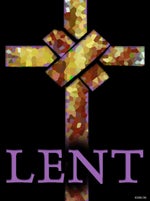Code
of Canon Law: “All Christ’s faithful are obliged by divine law, each in his own
way, to do penance. However, so that all may be joined together in a certain
common practice of penance, days of penance are prescribed. On these days the
faithful are in a special manner to devote themselves to prayer, to engage in
works of piety and charity, and to deny themselves, by fulfilling their
obligations more faithfully and especially by observing the fast and abstinence
which the following canons prescribe.” [Can.
1249]
Paul VI: “The time of Lent preserves its penitential character. The days of penitence to be observed under obligation throughout the Church are all Fridays and Ash Wednesday, that is to say the first days of ‘Magna Quadragesima’ (Great Lent), according to the diversity of the rites. Their substantial observance binds gravely.” (Pænitemini, II-1)
What is ‘fasting’? What is
‘abstinence’?
Fasting:
reduction in the amount of food consumed (e.g., only one full meal).
“The law of fasting allows only one full meal a day,
but does not prohibit taking some food in the morning and evening, observing –
as far as quantity and quality are concerned – approved local custom.” Pænitemini[1] III-1&2)
Abstinence:
refraining altogether from partaking in an otherwise lawful practice (e.g.,
eating meat).
“The law of abstinence forbids the use of meat, but
not of eggs, the products of milk or condiments made of animal fat.” Pænitemini III-1 & 2
“Eating between meals is not permitted, but liquids,
including milk and fruit juices, are allowed. Fish and all cold-blooded animals
may be eaten, e.g., frogs, clams, turtles, etc.”.
Who must fast and abstain?
Fasting
and abstinence are recommended by the Church for all the Faithful. Fasting and
abstinence are obligatory for certain age groups and on certain days.
Abstinence:
Years
of Age
|
Current discipline (1983 Code
of Canon Law)
|
Former discipline (1917 Code
of Canon Law)
|
0-14
|
No abstinence required.
“Nevertheless, pastors and parents
are to see to it that minors who are not bound by the law of fast and
abstinence are educated in an authentic sense of penance.” [Can. 1251]
|
No abstinence required, but age of exemption is restricted to 0-7 years.
|
14+
|
· all Fridays[4]
· Ash Wednesday
[Can. 1251]
|
Abstinence applies to those seven years old and older.
Abstinence from meat, or broth made of meat, required on:
·
all
Fridays[5]
·
Ash
Wednesday
·
Holy
Saturday
·
Vigil
of the Assumption of the BVM
·
Vigil
of Christmas
‘Partial abstinence’ (meat permitted only
at the principal meal) on:
·
all
other weekdays of Lent (i.e., Monday through Thursday, and Saturday)
·
Ember
Wednesdays and Saturdays
·
Vigil
of Pentecost
|
Fasting:
Years
of Age
|
Current discipline (1983 Code
of Canon Law)
|
Former discipline (1917 Code
of Canon Law)
|
0-18
|
No fasting required.
“Nevertheless, pastors and
parents are to see to it that minors who are not bound by the law of fast and
abstinence are educated in an authentic sense of penance.” [Can. 1251]
|
No fasting required,
but age of exemption is expanded to 0-21 years.
|
18-59
|
Required to fast on:
·
Ash
Wednesday
·
Good
Friday
Strongly encouraged to fast on:
·
all
weekdays of Lent
·
Holy
Saturday[6]
|
Fasting applies to those twenty-one years old to fifty-nine.
Required to fast on:
·
Ash
Wednesday
·
every
day of Lent, except Sundays[7]
·
Good
Friday
·
Holy
Saturday
·
Ember
Days
·
Vigil
of Pentecost
·
Vigil
of Christmas
|
59+
|
No fasting required.
|
[1]
Paul VI, Apostolic Constitution Pænitemini
(On Fast and Abstinence), February 17, 1966.
[2]
Or from some other food as determined by the Episcopal Conference.
[3]
The National Conference of Catholic Bishops (USA) in their pastoral statement
of November 18, 1966 determined the following: “Catholics in the United States
are obliged to abstain from the eating of meat on Ash Wednesday and on all
Fridays during the season of Lent. They are also obliged to fast on Ash
Wednesday and on Good Friday. Self-imposed observance of fasting on all
weekdays of Lent is strongly recommended. Abstinence from flesh meat on all
Fridays of the year is especially recommended to individuals and to the
Catholic community as a whole.”
[4]
Unless a Solemnity should fall on a Friday.
[5]
Except on holy days of obligation outside of Lent.
[6]
“The paschal fast must be kept sacred. It should be celebrated everywhere on
Good Friday, and where possible should be prolonged throughout Holy Saturday so
that the faithful may attain the joys of the Sunday of the resurrection with
uplifted and responsive minds.” Vatican II, Sacrosanctum
Concilium (Constitution on the Sacred Liturgy), §109.
[7]
Except also Class I feasts (e.g., St. Joseph – March 19; Annunciation of the
Lord – March 25).

Since I am 60 plus does that mean I do not have to fast ?
ReplyDeleteThat is correct, as I understand it, Jeannie. Of course, if you are physically able to do so and want to, I don't think there's anything that says you CAN'T fast.
ReplyDeleteI do plan to Fast ....I think it is something I want to embrace even past Lent as lomg as I am able too ! I actually fast from meat on Wednesday's and Friday's been doing that since July 4th , 2012 : for the intention of the re-version of my 4 adult children back to the Catholic Church !
ReplyDeleteLike my spiritual director said : Have a miserable and joyful Lenten Season! Many blessings to you Dr. Jay!
What on earth do you mean by that, Anon?
ReplyDeleteAnd what awful name for a web site. I will certainly not check it out!
Burke, that was a spam comment that got through the filter! I removed it.
ReplyDelete